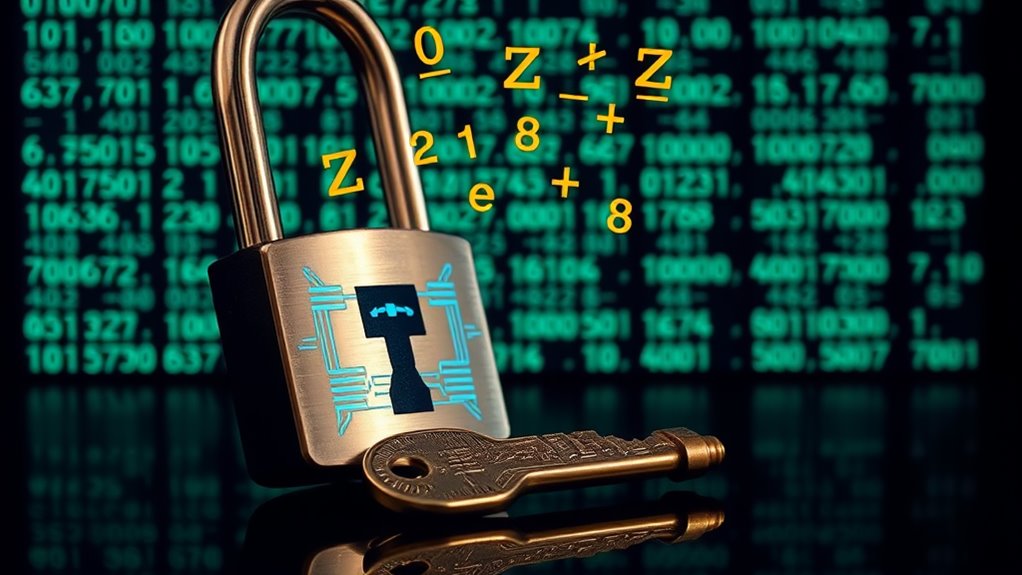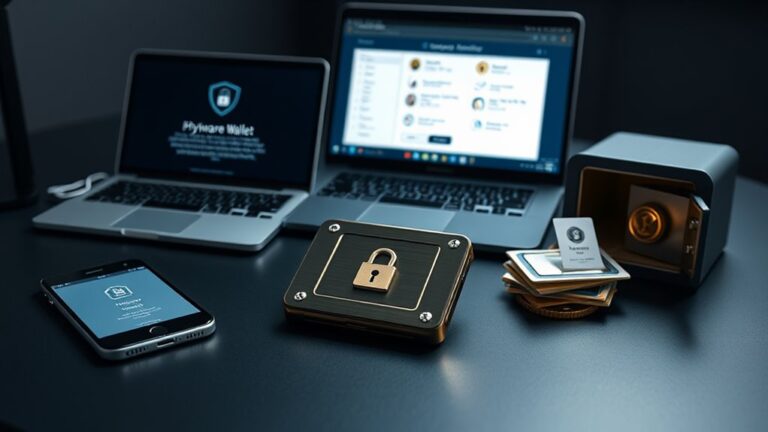What Is Cryptography?
Note: This post may contain affiliate links, and we may earn a commission (with No additional cost for you) if you purchase via our link. See our disclosure for more info. The gold and crypto world is constantly changing. This is not financial, investment, legal, or professional advice. So, please verify the information on the gold and cryptocurrency provider’s websites.
Cryptography is the method of keeping secrets, using tricky math to guarantee that only the right people can access information. Think of it like a digital secret handshake. It prevents snoopers from peeking at sensitive data. There are different types of encryption—one uses a single key, while the other has two keys. It's essential for everything from online shopping to military comms. Want to know more about how it all works? There's plenty to explore!

Cryptography is like the digital equivalent of a secret handshake—only with way more math and way less fun. It's all about keeping secrets, but with a twist. This complex world guarantees that only the right people can peek behind the curtain. Secure communication is the name of the game, using encryption to lock down data from prying eyes. Think of it as a digital vault where confidentiality reigns supreme. Only authorized parties get the keys. If they don't have it, tough luck!
Cryptography: the ultimate secret keeper, wrapping your data in math magic to keep it safe from prying eyes.
But wait, there's more! Integrity is essential; it makes sure your data isn't tampered with while it's being shuffled around. Picture a digital bouncer making sure everything is as it should be. And let's not forget about authenticity. Cryptography checks if the sender is who they say they are. It's like checking IDs at a bar—no fake ones allowed.
And just when you think it's over, there's non-repudiation. This fancy term means you can't just deny sending that embarrassing message. No take-backs! Blockchain networks rely on cryptographic immutability to ensure transaction records cannot be altered once added to the chain.
Now, how does it all work? There are two main types: symmetric and asymmetric encryption. Symmetric uses a single shared key—easy peasy. Asymmetric, on the other hand, uses public and private key pairs, which sounds way cooler. Symmetric Cryptography is known for its speed and efficiency in encrypting large amounts of data. Public Key Infrastructure (PKI) plays a crucial role in managing these keys effectively.
Then there are hash functions that guarantee data integrity. They create fixed-length strings, like fingerprints for your data. Digital signatures? They're a mashup of hashing and encryption, providing that extra layer of authenticity.
The history of cryptography is a wild ride. It started with simple ciphers like Caesar's back in ancient times, then morphed into sophisticated algorithms like AES and RSA.
Today, it's everywhere—protecting your online shopping, securing military communications, and even powering cryptocurrencies. So, next time you type a password or send a message, remember: cryptography has your back, even if it feels less like a secret handshake and more like a math exam.
Frequently Asked Questions
How Long Has Cryptography Been Used in History?
Cryptography has been around for ages. Seriously, since at least 1900 BC! The Egyptians were already messing with symbols in tombs.
Fast forward to the Spartans, who had their scytale for military chats. Julius Caesar? Yeah, he had his own cipher too.
From clay tablets in Mesopotamia to complex machines in WWII, it's been a wild ride.
Cryptography isn't just ancient history; it's been a game-changer through the centuries.
What Are the Main Types of Cryptography?
The main types of cryptography? Simple. There are three big players: symmetric, asymmetric, and hash functions.
Symmetric uses one key—think AES or DES. Asymmetric brings a pair of keys to the party, like RSA.
Then there are hash functions, the one-way street of data integrity, examples being SHA-1 and SHA-2. Some folks toss in digital signatures as a bonus, but really, it's all about those three core types.
How Does Cryptography Impact Online Privacy?
Cryptography is a game changer for online privacy. It's like a digital cloak, making sure snoopers can't peek at your stuff.
Without it? Yikes. Your data's out there for anyone to snag.
Encryption keeps chats private—sorry, nosy service providers!
But there's a catch. Backdoors? Total no-go. They just let the bad guys in.
And with quantum computing lurking, who knows how long current protections will hold up?
Trust but verify, folks!
What Is the Future of Cryptography Technology?
The future of cryptography looks like a high-stakes game of cat and mouse. Quantum computers are coming for current encryption methods, and it's not pretty. NIST's new standards are a step, but organizations are scrambling.
Good luck finding drop-in replacements! Emerging techniques like homomorphic encryption and quantum key distribution sound fancy, but they come with challenges.
It's a chaotic landscape where staying secure means constantly adapting. Buckle up; it's going to be a wild ride!
Can Cryptography Be Broken or Hacked?
Oh, absolutely. Cryptography can be broken or hacked. Weak keys? Check. Flawed algorithms? You bet.
Even those fancy encryption methods aren't foolproof. Look at Heartbleed—an OpenSSL blunder that spilled secrets everywhere.
And don't get started on quantum computing. It's like handing a kid a sledgehammer.
Sure, strong cryptography exists, but vulnerabilities lurk around every corner. It's a digital jungle out there, and not everyone's swinging a sturdy vine.













One Comment